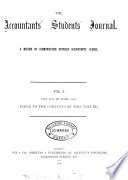 | Accounting - 1884 - 512 pages
...for the Italian method, as adopted by modern practice, " that it grounds itself upon the scientific axiom that the whole is equal to the sum of all its parts ; that it is satisfied with nothing less than a perfect equilibrium between the total amount of all... | |
 | Education - 1886 - 636 pages
...questions and the illogical responding to our logic. [AUGUST, contradictory is "unthinkable." I know that the whole is equal to the sum of all its parts, and I cannot believe that its contradictory is possible anywhere, let me try never so hard. All the... | |
 | Mark Hopkins - Mind and body - 1886 - 338 pages
...he affirms it, it would land us in our not being sure that we know anything at all. Do I then know that the whole is equal to the sum of all its parts, or that a body must be in space, as something that is relative to my mode of apprehension ? or do I... | |
 | University of Nebraska (Lincoln campus) - 1904 - 426 pages
...competition and that "other things are equal" (ie, unvaried) lend themselves to the physical conceptions that "the whole is equal to the sum of all its parts," and even in emergency, that a change in one side of an equation must be accompanied by a change in... | |
 | Mark Hopkins (D.D.) - Philosophy of mind - 1889 - 348 pages
...be affirms it, it would land us in our not being cure that we know anything at all. Do I then know that the whole is equal to the sum of all its parts, or that a body must be in space, as something that is relative to my mode of apprehension ? or do I... | |
 | Engineering - 1889 - 1380 pages
...subject? MR. HODGMAN: The view the committee takes is this: That while it is true, as Mr. Todd says, that the whole is equal to the sum of all its parts, still in make it true the several parts must be all expressed in terms of the same kind of measure,... | |
 | Nicholas Murray Butler, Frank Pierrepont Graves, William McAndrew - Education - 1892 - 562 pages
...in the modern doctrine of the "conservation of matter and energy," and this rests primarily on the axiom that the whole is equal to the sum of all its parts. Since both matter and energy are quantities capable of being measured in definite units, the doctrine... | |
 | Bible - 1891 - 740 pages
...different generically from the ideas of gravity, affinity, centripetence, order, and the like. The truth that the whole is equal to the sum of all its parts is absolute, and must remain true whether the intelligence to know it exists or not. But the law that... | |
 | United States. Supreme Court - Law reports, digests, etc - 1894 - 742 pages
...continuous and connected operation of the whole. This is no denial of the mathematical proposition that the whole is equal to the sum of all its parts, because there is a value created by and resulting from the combined operation of all its parts as one... | |
| |